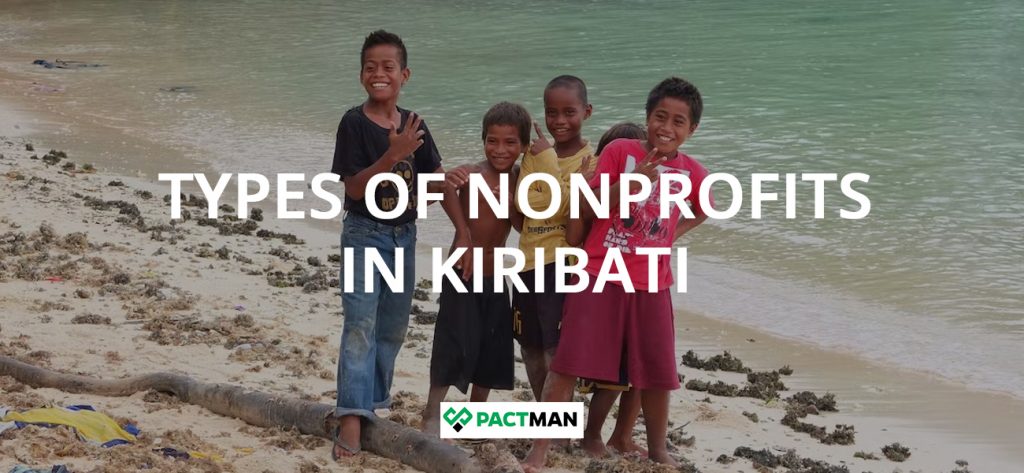Kiribati is a small nation in the Pacific Ocean, comprising 33 atolls and islands. Despite its size, it has a vibrant community that is supported by many nonprofits. In this article, we will consider the types of nonprofits operating in Kiribati and their various contribution to the island nation.

- A large number of nonprofits in Kiribati rely on funding options such as membership fees, subscriptions, and donations, among others.
- NGOs are also known to receive aid from international organizations such as the World Bank and the United Nations.
What are the types of nonprofits in Kiribati?
There are three types of nonprofits recognized in Kiribati. We will highlight each of these entities and their operations.
1. Nongovernmental organizations (NGOs)
NGOs are private organizations established to serve the benefit of society. These types of nonprofits operate across various sectors but do not prioritize profit-making. Some of their activities include providing social services, empowering the poor, and carrying out community development initiatives.
The Kiribati Association of Non-Governmental Organizations (KANGO) is the governing body for NGOs.
Also, a large number of these nonprofits rely on funding options such as membership fees, subscriptions, and donations, among others. NGOs are also known to receive aid from international organizations such as the World Bank and the United Nations.
2. Faith-based organizations (FBOs)
These types of nonprofits largely contribute to international peacebuilding. Likewise, FBOs are established by churches and other religious institutions to promote their faith as well as impact communities. These organizations, for over a century, have contributed to healthcare development in most developing nations.
FBOs are oftentimes the primary development-focused organizations as well as the oldest in most remote communities. Also, they are known to maintain close ties with the residents while helping to address critical cultural factors such as high child morbidity and mortality. Faith-based organizations hold on to the belief that they are morally obligated to provide assistance to the needy and improve the standard of living of people.
3. Civil Society Organizations (CSOs)
These types of nonprofits are known to take part in social, economic, and cultural activities. They neither belong to a state nor a family. In general, CSOs primarily take on the role of advocacy. These organizations are often considered the foundation of modern political parties.
Some of the roles of CSOs include advocacy, provision of services, government watch, disclosure, spread of information, and community aid. Members of civil society organizations comprise citizens, volunteers, unpaid staff, and paid staff. CSOs are constantly at the forefront of maintaining civic and public life.
What are the examples of nonprofits in Kiribati?
In this section, we will outline some of the most popular classes and examples of nonprofits in Kiribati.
a. Environmental Organizations
Kiribati is an incredibly diverse country with an exceptional range of coral reef ecosystems and wetlands. However, many of these ecosystems are threatened by pollution and garbage. To combat these issues, several environmental nonprofit organizations have been established to protect the environment in Kiribati.
For example, the Kiribati Climate Action Network (KiriCAN) is an independent organization that works to address climate change issues in the country.
b. Healthcare Charities
Kiribati is one of the world’s smallest countries. However, due to its isolation, the country continues to grapple with significant healthcare issues. Many rural residents lack access to emergency care or even basic healthcare services like immunizations. As a result, numerous healthcare charities have been founded to address this issue. However, most of the Healthcare Charities are international organizations also spread across various countries across the globe.
c. Education Nonprofits
A large number of Kiribati citizens lack access to education. This is especially rampant among those living in isolated islands or atolls without access to good schools or teachers. However, education nonprofits are taking the lead as they work to address some of these issues. One such is the Good Samaritan Foundation which has assisted in building classrooms while providing scholarships to students to help further their education.
Conclusion
To sum up, every civilization relies on the input of nonprofits. This is especially true for underdeveloped nations like Kiribati, where resources are scarce and access to essential services might be challenging. Hence, the various types of nonprofits assist in filling some of the voids in society while fostering community development.
If you enjoyed reading this article, please leave a comment at the bottom of this post.


